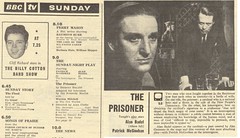There are many websites willing to explain the origins of The Prisoner. This one of the more official and it speaks of one particular historical curiosity. http://www.the-prisoner-6.freeserve.co.uk/faq_02.htm
There was certainly a one-off play called "The Prisoner" starring Patrick McGoohan transmitted in 1963,
but it had nothing to do with the later TV series in any way.
but it had nothing to do with the later TV series in any way.
Having dismissed this play as having no significance, the web-page does spend some time waffling about how Kenneth Griffith claimed to have been blocked from appearing in the TV play by Patrick McGoohan himself – a somewhat ridiculous-sounding statement, especially given that there is a far more interesting trivia about Griffith’s connection to this play. He actually appeared in the film version of 'The Prisoner' in 1955, as the Recorder. His credit reflects the fact that in this play/film the characters are not given names. Here he is alongside Jack Hawkins, who was playing the Interrogator: Checkmate.
 |
| 1954 Theatre Publicity |
 |
| 1963 TV Publicity |
Watching the 1955 film rings one bell after the other. To start with, the starkly metallic main titles have a slightly Albertus feel about them.
As the story begins we learn that the prisoner is to be broken by non-violent means. In fact, the interrogator tells the prisoner that the prisoner’s body is sacred to the interrogator, or as Leo McKerns No2 would put it: “I want him with a whole heart. Body and soul”. However the Interrogators’ superior is impatient with the process, just as Leo Mckern’s No1 would be impatient with his methods.
 |
| "A week? That's not long enough!" |
Kenneth Griffith’s character – the secretary or recorder – is involved in keeping the prisoner under constant surveillance and recording his words onto tape and vinyl. He is being trained in immorality by the interrogator he works for.
The interrogator himself has to explain and justify himself constantly to his superior, just like McGoohan's No2's are constantly having to do.
 |
| "If he'll answer one single question the rest will follow." |
There are ideas of entrapment – the spider and the fly and questions like WHY? The interrogator in one crucial sequence takes his prisoner back to his childhood and indeed his school-days. The episode 'Once Upon A Time' is certainly a surrealistic and direct riff on this play, but McGoohan has a more optimistic resolutuion, with the prisoner overtly winning that time.
 |
| There are newspapers |
He tries to explain but his boss, the General, cannot fathom what this experienced professional is talking about and clearly distrusting the interrogator now, warns him that he shall have to seek further advice and then sends him into an adjoining room, which has bars on the windows. The film ends with the suggestion that we now have a new prisoner of conscience. It's almost like the much babbled-about prequel ideas that many prisoner fans have regarding their No6 being somehow behind the creation of the village in the first place.
 |
| The interrogator becomes a prisoner too "I was a good man. But if you get him, he will be better" |
In the recent (2007) deep analysis of The Prisoner series, on page 12, this play is mentioned –once – in passing and the subject does not crop up again.
As long before as 1977, in conversation with Warner Troyer in Canada, Patrick McGoohan said,
“this "Prisoner" thing ….. initially came to me on one of the locations on "Secret Agent" when we went to this place called Portmeirion, where a great deal of it was shot, and I thought it was an extraordinary place, architecturally and atmosphere-wise, and should be used for something
and that was two years before the concept came to me.”
McGoohan completed shooting the first series of Danger Man in Portmeirion for at the end of 1960. At the beginning of 1963 he made his TV version of Bridget Boland’s play. It was two years later.
So why do the official histories of McGoohan’s 1967 show seem so dismissive of this old play, of the same title, saying,
“it had nothing to do with the later TV series in any way” ?
“it had nothing to do with the later TV series in any way” ?
This is clearly absurd as I hope my blog reader will have noticed. The reason seems to be because their creation story requires George Markstein to be attributed as having come up the original ideas for the show. Anything that demonstrates how Patrick McGoohan’s own career and indeed his own life was riddled with reasons why he would have “thought it up” are necessarily diminished because these FACTS do not fit with their own neatly published and polished tracts.
W H Y ?
Because you let them, that's why. Don't be a cabbage.















Moor, your posts continue to be, not only interesting, but satisfying. I guess I will have to find that movie now.
ReplyDeleteAlso, I like your last line. Maybe I will adopt that as my new life motto.
http://www.modcinema.com/categories/6-new-arrivals/541-bonditis-1968-dvd
ReplyDelete